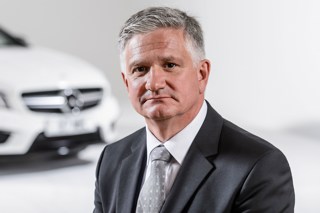There has been much discussion recently about the evolving strategies that dealerships must adopt to remain competitive in the automotive market – a space that is continuously evolving and changing at speed, says PHM Group’s Tom Carr.
Shifting consumer behaviours, advancing technology, and new market entrants are just some of the things that are compelling dealerships to rethink their traditional models.
With over 30 years of experience in the automotive industry, PHM Group (PHM) has been at the forefront of assisting OEMs and, in turn, franchise dealerships to transform their operations to positively react with current market trends.
Its expertise in implementing up-to-date solutions and best practices has enabled numerous dealerships to thrive in one of the most competitive environments through some of the most tumultuous economic years in recent history.
PHM believes that the key to future-proofing a dealership lies in enhancing customer satisfaction and employee engagement, which can be achieved through personalised customer interactions, team empowerment, transparent communication, continuous improvement and regular coaching.
While these strategies have proven effective, they also pose certain challenges. So, how can dealerships effectively implement these best practices to ensure long-term success?
Crafting unique experiences
As customer preferences change, and the automotive shifts from a traditional dealer-led approach to a customer-led sales model, understanding each customer’s unique needs and preferences is more than just good business today – it’s essential.
Modern customers expect tailored service and not a one-size-fits-all approach, meaning that there is so much value in trying to understand a little about the customer, going beyond simply “selling a car” to truly understanding the customer’s lifestyle and future aspirations.
Personalisation should permeate every interaction, from initial contact to post-purchase follow-ups. These days, dealerships can track preferences and previous interactions, offering a seamless, customised experience, leading to the customer feeling less ‘processed’ along the way.
Results show that proactive communication that anticipates customer needs helps them feel valued and understood, fostering loyalty and repeat business, which helps form bonds and boost bottom lines.
Ultimately, each customer wants to feel like they matter, and that their needs are being listened to; there would be no point in showing a customer a two-door hatchback when they’ve specified looking for an SUV for their three children, for example.
There is also an increasing recognition that the initial sale is only the start of the customer relationship, with a need to invest in what’s become known as lifetime value, and not forgetting the value of repeat and regular customers.
But a seamless customer experience does not just ‘happen’ – the entire dealership network of employees needs to work together closely with appropriate training, ensuring that service professionals own the customer relationship, ultimately contributing to the lifetime value of those customers.
Building a responsive workforce
However, regardless of how important returning and loyal customers are to any business, a dealership’s success hinges not only on its customers but also on its employees. Empowering staff with the knowledge and authority to make decisions can transform the customer experience for all involved.
Continuous training and development are crucial to ensuring the long-term happiness of employees, as well as creating a strong, responsive customer-facing workforce with employees who have the skills needed to excel.
Confident, well-trained employees are more likely to deliver exceptional service, going the extra mile to satisfy customers. In today’s technology-focused revolution, it’s crucial that employees are not only digitally adept but also able to maintain a personalised touch in customer service.
The post-pandemic landscape has seen a notable shift, with customers increasingly seeking personalised experiences and placing a higher premium on quality service. In response, dealerships must focus on creating positive work environments that foster a sense of belonging and motivation.
Team building activities, recognition programmes, and open communication are key strategies in this effort. When employees feel engaged and valued, they contribute to a more welcoming atmosphere that directly impacts customer satisfaction.
By empowering dealer employees with the knowledge and skills to make in-the-moment decisions, businesses can ensure that customers receive the best possible service. This approach not only enhances the customer experience but also reinforces the company’s commitment to the customer.
Honest communication and establishing trust
Transparency is a cornerstone of trust in any relationship, and the dealer-customer relationship is no exception. Honest communication about what a dealership can and cannot deliver is crucial, and whether it’s the battery range of a new electric vehicle or repair timelines for the service department, setting realistic expectations helps avoid a plethora of disappointments across the board.
Dealerships should also aim to communicate proactively rather than reactively. This means updating customers regularly on the status of their orders or repairs, even if the news is not always positive.
Proactive communication shows that the dealership values the customer’s time and concerns. For instance, if a part is delayed, informing the customer promptly and offering alternative solutions can turn a potentially negative experience into a positive one.
Consistency in messaging across all customer touchpoints – whether in person, over the phone or online – is also key. Miscommunications can lead to misunderstandings and frustration, so a unified approach to communication ensures that customers receive the same accurate information regardless of who they speak with.
Fostering a culture of continuous improvement
The automotive industry is dynamic, requiring dealerships to be agile and innovative, therefore a culture of continuous improvement is vital. Dealerships should encourage regular process reviews and welcome ideas from all departments, ensuring that this collaborative approach can therefore uncover insights that lead to more efficient operations and better customer service in the longer term.
Fostering a culture of continuous improvement means regularly evaluating and refining processes to eliminate inefficiencies and enhance overall quality. This practice not only improves operational efficiency but also keeps employees engaged and motivated by demonstrating that their contributions make a difference.
Regular coaching and nurturing talent
Regular coaching sessions are vital for the continuous development of dealership employees. Rather than waiting for a customer complaint or a mystery shop to highlight areas for improvement, dealerships should implement ongoing coaching and observation sessions.
These sessions provide immediate feedback and development opportunities, helping employees refine their skills and enhance their performance.
Coaching should be seen as a supportive tool, not a punitive measure. Focusing on positive reinforcement and constructive feedback creates an environment where employees feel valued and motivated to excel.
Regular coaching ensures that employees stay aligned with the dealership’s goals and standards, leading to a more consistent and high-quality customer experience, as well as ensuring that staff are well-prepared to handle real-world situations effectively and meet customer needs with confidence.
By adopting these best practices, dealerships can significantly enhance their ability to provide exceptional customer experiences and foster a motivated and skilled workforce.
These are all strategies that focus on building a solid foundation for long-term success, and not only improve customer satisfaction but also create a positive and dynamic workplace, thus positioning the dealership as a leader in the competitive automotive market.
Tom Carr is managing director at Automotive Consultancy PHM Group.



















Login to comment
Comments
No comments have been made yet.